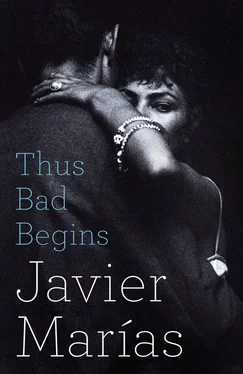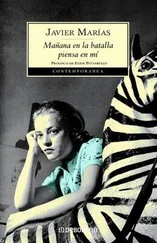But each individual believes he is fully formed in each and every phase of his existence, that he has a specific character subject only to minor variations, and considers himself to be prone to certain actions and immune to others, when the truth is that, as children or youths, most of us have not been tested, we have not yet found ourselves at a crossroads or faced with a dilemma. Maybe we never are fully formed, but begin unwittingly to configure and forge ourselves from the moment we first hove into view as a tiny dot on the ocean, one that gradually grows in size until we form a definite shape to be either avoided or approached, and as the years pass and events enfold us, we accept or reject the options offered to us or allow others to do so on our behalf (or is it just the air itself?). It doesn’t matter who makes the decision, everything is horribly irreversible and, in that sense, everything evens out: the deliberate and the involuntary, the accidental and the planned, the impulsive and the premeditated, and, ultimately, who cares about the whys, still less about the wherefores?
When I look at my own daughters, they don’t seem very formed to me, but, given their young age, that’s only natural; on the other hand, they doubtless consider themselves to be fully formed, as almost fixed entities, just as I did when I was twenty-three and before that too, I suppose; we pay so little attention to the changes that take place in us that we forget how they happened and forget them entirely once we’ve been through them. I had finished my degree with good marks and without any mishaps; and even though it was entirely thanks to my parents and their long friendship with Muriel that I had instantly found employment with a remarkable person, whom I admired almost unreservedly and whose approval and trust contributed to my seeing myself in a highly favourable light, I couldn’t help but feel proud as well, convinced that my boss must have seen something in me, that he had, at the very least, taken a liking to me, given that he had employed me and kept me on; I sometimes even had the flattering sense that he occasionally forgot about my family connections and about how he had come to give me the job, that I was the son of those old friends from his youth, the De Veres, of whom he remained very fond, even though they were now more often in touch by letter or only very infrequently, since my parents were usually living in some far-flung place and I was seldom with them. After all, I was very well read, had seen a lot of paintings and even more films; I had a considerable store of knowledge and was doubtless a pedantic young man, although I kept my pedantry to myself when it was inappropriate, for example, when I went out at night with my friends or with girls; I was fluent in one foreign language and spoke another reasonably well, and I knew that in my own language I had access to a wide vocabulary, far wider than that of most of my contemporaries, which meant I could comfortably take part in the conversations held by Muriel and his circle, who were older and wiser than me (at least in theory), although on those occasions I tended to listen and not intervene too much, and their talk often descended from the heights and meandered about in some very low territory, accompanied by loud guffaws; I had spent time abroad, whenever my parents included me in their prolonged and varied diplomatic postings, although they usually preferred me to stay in Madrid and to continue my education at the same school, wanting me to put down some deeper roots, at least that was the excuse they used for leaving me here in term-time, and even when there were no more terms, in the care of my aunt and uncle, Julia and Luis; they were happy for me to grow up alongside my cousins Luis and Julia, who have been like half-siblings to me, since I have no siblings of my own. No one has ever kept a very close watch on me, and for the most part — except when my parents were visiting or during the vacations, although they didn’t always come even then, often taking the opportunity to travel on their own — I was left alone in the family home under the negligent eye of various nursemaids or housekeepers or whatever you might call them, who never stayed long enough to become attached to me or to wield any real authority over me. From adolescence on, I was accustomed to never really having to answer to anyone very much, to returning home at odd hours and choosing where I slept, in my parents’ apartment or at my aunt and uncle’s place or, on some nights, at neither: this was in my early youth, from the time, let’s say, when I became an undergraduate at seventeen.
When I was twenty-three, I was still living like that, or possibly even more autonomously: alone in my parents’ apartment, with a backdrop of ever-changing daily helps, who would leave me food in the fridge and do the cleaning, who saw very little of me and of whom I saw even less. My parents were not so much wealthy — although they had no financial worries, they lived pretty much from day to day — as superficial and casual. Despite my father’s vague aspirations to originality or greatness, his diplomatic career had not been particularly dazzling, his main achievement being his appointment to the consulate in Frankfurt, which happened rather late; however, he retained the kind of deep-seated youthful optimism typical of the frivolously minded, an optimism he shared with my mother. I often had the feeling that I was slightly superfluous to their lives, or not superfluous exactly, more as if I were an old acquaintance over whom they watched from a distance, with no great enthusiasm or concern, but with undeniable affection; they behaved like a childless couple or as if they were my aunt and uncle or my godparents; I never had any cause for complaint, for they were charming if inconstant companions, or is it simply that we accept as normal whatever world or situation we’re born into? At any rate, I couldn’t rely on receiving much in the way of an inheritance (although they did own their apartment), and so, despite the privileges I’d enjoyed in childhood and adolescence, I was aware from early on that I would have to earn my own living like everyone else; that was why I was so delighted to have a job and an income, however temporary, and even though I had no idea what I would do when Muriel eventually dispensed with my services, as was bound to happen at some point. At the time, I felt no need to gain my independence, since I’d been living entirely independently for a long time, perhaps from too young an age, which is possibly why I began spending more and more hours at Muriel’s apartment, where there was, at least, a family, people companionably coming and going, entering and leaving, and some nights I even slept in that isolated bedroom, beyond the kitchen, which was, up to a point, mine, for habitual use makes us tacit owners as long as that habit or use is not taken away from us or expressly forbidden; so many people arrive at some temporary stopping-place from which there’s no uprooting them and where they end up spending half their lives. You should never allow anyone to stay, not even for a day, unless you’re prepared for them to stay for ever.
Anyway, I believed myself to be fully formed and finished and felt that, broadly speaking, I knew my own character. I didn’t know where I’d learned the rules of behaviour by which I tried to live my life (not from my parents, who had no rules at all or else kept changing them, but then maybe that’s part of being a diplomat), but I never behaved in a solemn or ostentatious manner; I’ve always loathed pompous, bombastic individuals, or recriminatory types, who insist on imposing their guidelines on others instead of keeping them to themselves. Perhaps I’d gleaned those rules from films, novels or comic books, which is how it was, up until fairly recently, for boys and young men who lacked any clear role models in real life (and in real life nothing is ever very clear; it doesn’t even tell a story), especially when those stories were troubling and ambiguous and not mere edifying nonsense. I considered myself to be fairly respectful and loyal and a man of scruples, capable of guarding any confidence entrusted to me and of keeping a secret if asked to do so; what I feared most was disappointing those I loved or admired. Muriel belonged to the latter group right from the start and gradually became one of the former — no, not gradually, quickly: unless you really take against someone, you inevitably grow fond of them over time (there isn’t any happy medium, indifference barely exists, however many struggle to achieve it); and that is what happened to me with him and, of course, with Beatriz Noguera, and with their children, especially their oldest daughter, Susana, partly because of her resemblance to her mother, but also partly because of her kind heart and friendly nature; and even with Flavia and Rico and Roy, and with Gloria and Marcela, however much they irritated me and made me feel uneasy and however much I felt they were a bad influence on their friend. And even with Van Vechten before that afternoon in the sanctuary of Our Lady of Darmstadt; after that, for no objective reason, I couldn’t stomach the man, although it was no business of mine what Beatriz did, let alone what he did — that was up to them. One of the rules I was trying to follow was more or less this: to judge other people as little as possible and not to meddle in their lives, still less intervene in them. My wish was to see no shape in the ocean, and not to have to come to any decision as to what it was, but that’s impossible, because I, too, was a shape which others might recoil from or aim for or collide with.
Читать дальше












